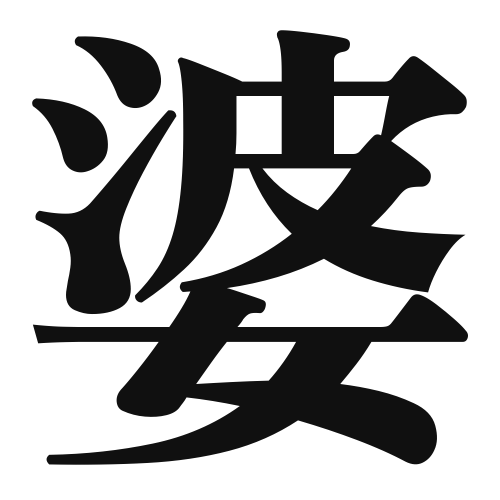1. Overview of Meaning
The kanji “婆” (bā) primarily means “old woman” or “grandmother.” It is often used to refer to elderly women in a familial or respectful context.
2. Formation and Radical
Formation of the Kanji: The kanji “婆” is a phonetic compound (形声文字) that combines the radical for “woman” (女) with a phonetic component that suggests the sound “ba.” This structure indicates that the character relates to women and has a specific pronunciation.
Radical: The radical of “婆” is 女 (woman), which is commonly found in kanji related to female figures.
3. Examples of Usage
Common Words and Phrases:
- 婆さん (ばあさん, bāsan) – an informal term for grandmother or an old woman.
- お婆ちゃん (おばあちゃん, obāchan) – a more affectionate term for grandmother.
Example Sentences in Daily Conversation:
- 私の婆はとても優しいです。 (Watashi no bā wa totemo yasashii desu.) – My grandmother is very kind.
- お婆ちゃんの家に遊びに行きます。 (Obāchan no ie ni asobi ni ikimasu.) – I will go to visit my grandmother’s house.
4. Synonyms and Antonyms
Similar Kanji:
- 母 (はは, haha) – meaning “mother,” which refers to a female parent, but is not specifically about age.
- 姉 (あね, ane) – meaning “older sister,” which also denotes a female but in a different familial context.
Antonyms:
- 若者 (わかもの, wakamono) – meaning “young person,” which contrasts with the elderly connotation of “婆.”
5. Cultural and Historical Background
Relation to Japanese Culture: In Japanese culture, grandmothers often hold a significant role in family life, being seen as wise and nurturing figures. The term “婆” can carry both affection and respect.
Proverbs and Idioms:
- 「婆さんの知恵」 (Bāsan no chie) – meaning “the wisdom of grandmothers,” which highlights the value of the elderly’s experience and knowledge.
